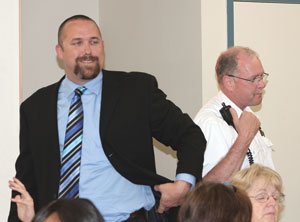
Director of Prevention Cory Mashburn (left) is leading the effort to consolidate resources for drug abuse prevention and recovery. - Photo by Harry Kane
By Harry Kane
The City of Somerville Health Department’s Office of Prevention hosted a workshop entitled How to Save a Life on June 28 at the Cross Street Senior Center. “SOP is a coalition of 700 volunteers consisting of the Trauma Response Network, Tobacco Control, and programs to prevent underage drinking and substance abuse. They’re all under one umbrella now,” stated Cory Mashburn, The Director of Prevention at City Hall.
The workshop partnered with local Organizations: AIDS Action Committee, Team Empowerment, Save Our Somerville (SOS) and (CASPER) the Cambridge and Somerville Program for Alcoholism and Drug Abuse Rehabilitation to educate the community and re-state their commitment to saving lives.
*
The workshop focused on the trauma associated with binge drinking and the use of pain relief medications known as Opioids. Be-Verlyn Navarro, the Emergency Nurse Manager of Cambridge Hospital, Somerville Campus, expounded in great length the results of clinical studies. “We get roughly 4,400 patients a year that are admitted for intoxication. Of those approximately 600 are severely intoxicated.” An overdose of alcohol can lead to respiratory depression, which may cause the person to stop breathing resulting in death.
*
Patty Contente, Clinical Youth Specialist, manages the Somerville Trauma Response Network. “Our primary focus was the Narcan Training.” Narcan is a Nasal Spray opioid antagonist that helps counteract the effects of narcotic over dosages. Seven new Narcan responders were registered during this workshop out of the fifty-two attendees. “Before, only medical personal could legally administer the drug, that’s now changed,” Contente said. AIDS action Committee, formerly known as Cambridge Cares about AIDS, is one of the seven pilot programs in Massachusetts that currently offers training in Narcan response to community members.
*
Why do overdoses happen? Often an overdose occurs when alcohol and drugs are mixed.
*
Typically overdoses happen 1-3 hours after using the substance. Some symptoms of an overdose include deep snoring or gurgling, sometimes referred as a death rattle, pale clammy skin, infrequent breathing, a heavy nod, and a slow heartbeat. If unconscious it is important to turn the person onto their left side with their mouth downward.
*
Emergency Dispatcher Terri Medeiros spoke about the necessary information when calling the Somerville Police Department’s 625-1212 number. “Just give your name, the address and telephone number, and leave the door open.” Terri recalled that people who are telephoning the police dispatchers are sometimes scared. They often don’t provide the dispatcher with the proper information. “They might say there’s someone OD-ing on Highland but not mention whether it was Highland Avenue or Highland Road. I need to know the building number, the apartment number, if they are in the basement, third floor apartment, wherever. If incorrect information is provided it could be too late for them and then their death will be on your conscience,” she said sternly.
*
Matthew McLaughlin, President of SOS, explained, “We want to remember the kids that passed away and humanize them, and discourage future generations from going down the same path. It’s important to remember that these kids weren’t bad people, they just had some problems.”
*
One of the kids that survived to tell his story was at the workshop speaking about his troubles with addiction and recent recovery. Michael Sullivan, 24, has been clean for the past 12 months. “I’d been using since I was 13. I’d do it anywhere I could, the locker room before a hockey game, anywhere. The First time I overdosed I was 14. I was messed up on Heroine, OxyContin and kolatopins. I almost died that day. I guess I got lucky a few times.” Michael now works at UPS and stays busy with new friends, a great girlfriend, and plays on three different softball leagues.













Reader Comments